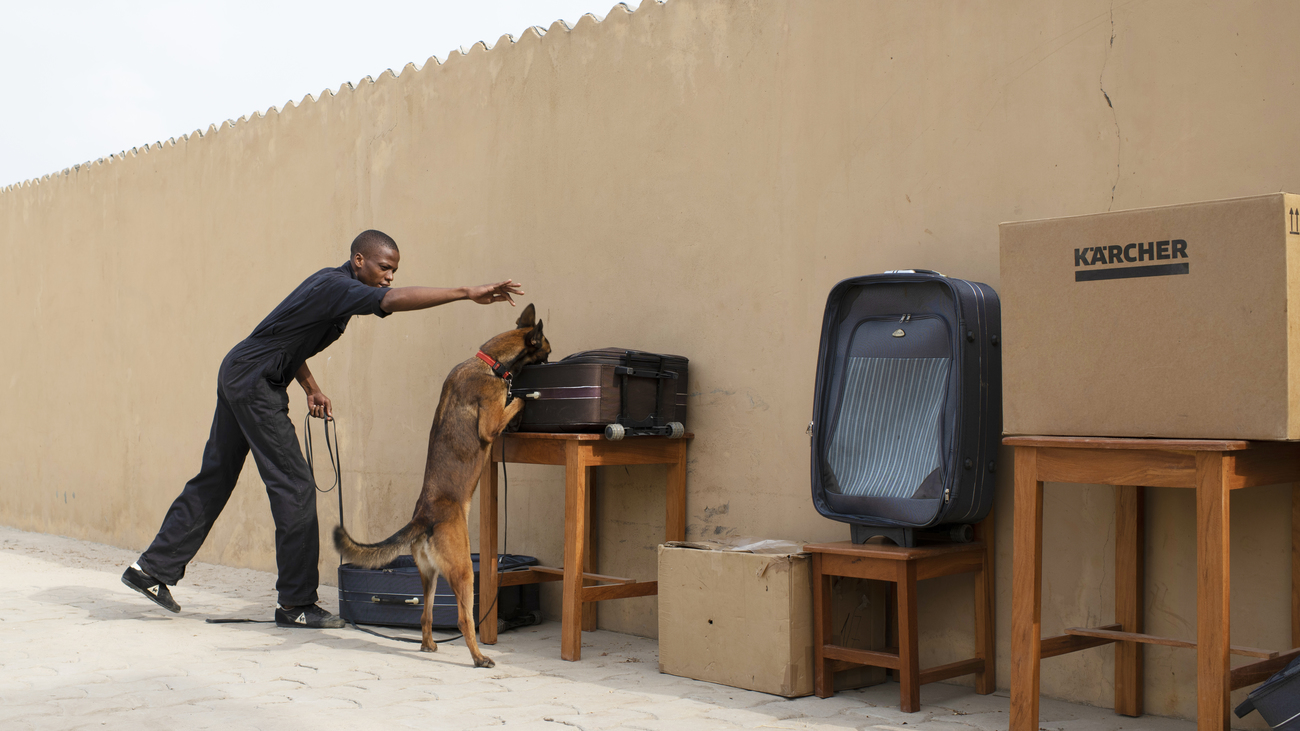Detection Dogs - Benin
Dogs can sniff out wildlife crimeifaw trains the first detection dog police units in Benin
ifaw trains the first detection dog police units in Benin

Six months ago, on 20 February 2020, in the heat of Cotonou, Benin, four police officers stood in their official uniforms in front of an assembly of distinguished guests. Amongst those guests were Sacca Lafia, Minister of the Interior and Public Security, and Soumaila Yaya, Director General of the Republican Police. Nabil, Francis, Diaz and Léopold received their training certificate for having successfully concluded IFAW’s eight month-long intensive dog-handler training program. They share this success with Frederic, and Tiburce, who is to become the unit's local trainer.
Creating and training the detection dog team
Selected from among forty volunteer police officers after difficult physical and technical tests, these officers probably never imagined that – alongside their dogs from France – they would be forming the first four dog units in Benin dedicated to the fight against the trafficking of protected wildlife species. In a region of the world where dogs’ olfactory capacities are unknown and people generally fear dogs, we had a great task ahead of ourselves. Our main mission: the dogs had to learn how to detect elephant ivory and pangolin scales, while the handlers had to learn how to understand the dogs and guide them when searching for wildlife products. These officers are now leading players in the constant, complex fight against one of the most lucrative transnational crimes, which decimates millions of animals every year, including 100,000 pangolins, 20,000 elephants and 1,000 rhinos.
Opportunities on the horizon to disrupt wildlife trafficking
On 20 February, the dog-handler units displayed their skills to the audience, amazed at the dogs' ability to detect a few milligrams of elephant ivory or pangolin scales enclosed in some of the luggage placed on the ground or higher up on tables. We now can inaugurate a "2020 version" of the K9 Brigade facilities, which we have completely rejuvenated, modernized, expanded and equipped to incorporate high standards of animal and human welfare. This follows a commitment we made to the Beninese government in May 2018 to extend the security mission of this particular police force to include the fight against illegal wildlife trade. Thanks to fifteen months of work undertaken simultaneously by the companies Siven Afrique and DCG-BTP, we were able to…
- double the surface area of the dog runs and create two parks where the dogs like to lie in the shade of a large mango tree
- build a veterinary practice where the animals can benefit from the best possible care under appropriate hygiene and safety conditions
- create offices and functional areas that provide good working spaces for the personnel,
- build a structure entirely dedicated to the daily training of the dog teams where inspection conditions, such as a luggage conveyor belt in an airport environment, can be recreated.
The new training structures allow the dog handlers to refine their techniques, while the dogs, just like high-level athletes, can refine their sense of smell of the materials they will have to be able to detect during operations. Coupled with great mobility, their sense of smell will enable them to check 200 to 300 pieces of luggage in 20 minutes, with a detection success rate of 70 to 95% depending on the animal's level of experience. It is worth pointing out that humans – even when using tools – barely reach 30%. Now operational, the officers will soon be deployed to strategic sites, such as Cotonou airport and port, thanks to the two vehicles provided by IFAW, which have been specially adapted to transport the dog units. With their fellow dog companions, they are ready to challenge the traffickers.
Deploying well-trained and well-equipped canine units isn’t only a question of national security, but also a public health issue as we have seen from the emergence and rapid spread of COVID-19 around the world. Their willingness to protect the animals of their country is strong and we will be sure to keep you informed about their progress. We must remember that fighting biodiversity loss more effectively and more firmly is the responsibility of every one of us.
To increase our impact, we work together with several partners that support the development of IFAW’s training program. Morin offers a reduction when purchasing dog equipment, Almo Nature provides food for the unit's detection dogs, and Ceva Santé Animale provides appropriate veterinary products. In addition, the first year of our work was co-funded by the Elephant Crisis Fund.
Related content
Every problem has a solution, every solution needs support.
The problems we face are urgent, complicated, and resistant to change. Real solutions demand creativity, hard work and involvement from people like you.